- Home
- Nnedi Okorafor
Binti Page 4
Binti Read online
Page 4
The fish was delicious, but it was full of bones. And it was as I was using my tongue to work a long, flexible, but tough bone from my teeth that I looked up and noticed the Meduse hovering in the doorway. I didn’t have to see the withered tentacle to know it was Okwu. Inhaling with surprise, I nearly choked on the bone. I dropped what was left, spat out the bone and opened my mouth to speak. Then I closed it.
I was still alive.
Okwu didn’t move or speak, though the blue current still connected us. Moments passed, Okwu hovering and emitting the foul-smelling gasp as it breathed and me sucking bits of fish from my mouth wondering if this was my last meal. After a while, I grasped the remaining hunk of fish with my forearms and continued eating.
“You know,” I finally said, to fill the silence. “There are a people in my village who have lived for generations at the edge of the lake.” I looked at the Meduse. Nothing. “They know all the fish in it,” I continued. “There is a fish that grows plenty in that lake and they catch and smoke them like this. The only difference is that my people can prepare it in such a way where there are no bones. They remove them all.” I pulled a bone from between my teeth. “They have studied this fish. They have worked it out mathematically. They know where every bone will be, no matter the age, size, sex of the fish. They go in and remove every bone without disturbing the body. It is delicious!” I put down the remaining bones. “This was delicious, too.” I hesitated and then said, “Thank you.”
Okwu didn’t move, continuing to hover and puff out gas. I got up and walked to the counter where a tray had been set. I leaned down and sucked up the water from this bowl as well. Already, I felt much stronger and more alert. I jumped when it spoke.
“I wish I could just kill you.”
I paused. “Like my mother always says, ‘we all wish for many things,’” I said, touching a last bit of fish in my back tooth.
“You don’t look like a human Oomza Uni student,” it said. “Your color is darker and you . . .” It blasted out a large plume of gas and I fought not to wrinkle my nose. “You have okuoko.”
I frowned at the unfamiliar word. “What is okuoko?”
And that’s when it moved for the first time since I’d awakened. It’s long tentacles jiggled playfully and a laugh escaped my mouth before I could stop it. It plumed out more gas in rapid succession and made a deep thrumming sound. This made me laugh even harder. “You mean my hair?” I asked, shaking my thick plaits.
“Okuoko, yes,” it said.
“Okuoko,” I said. I had to admit, I liked the sound of it. “How come the word is different?”
“I don’t know,” it said. “I hear you in my language as well. When you said okuoko it is okuoko.” It paused. “The Khoush are the color of the flesh of the fish you ate and they have no okuoko. You are red brown like the fish’s outer skin and you have okuoko like Meduse, though small.”
“There are different kinds of humans,” I said. “My people don’t normally leave my planet.” Several Meduse came to the door and crowded in. Okwu moved closer, pluming out more gas and inhaling it. This time I did cough at the stench of it.
“Why have you?” it asked. “You are probably the most evil of your people.”
I frowned at it. Realizing something. It spoke like one of my brothers, Bena. I was born only three years after him yet we’d never been very close. He was angry and always speaking out about the way my people were maltreated by the Khoush majority despite the fact that they needed us and our astrolabes to survive. He was always calling them evil, though he’d never traveled to a Khoush country or known a Khoush. His anger was rightful, but all that he said was from what he didn’t truly know.
Even I could tell that Okwu was not an elder among these Meduse; it was too hotheaded and . . . there was something about it that reminded me of me. Maybe its curiosity; I think I’d have been one of the first to come see, if I were it, too. My father said that my curiosity was the last obstacle I had to overcome to be a true master harmonizer. If there was one thing my father and I disagreed on, it was that; I believed I could only be great if I were curious enough to seek greatness. Okwu was young, like me. And maybe that’s why it was so eager to die and prove itself to the others and that’s why the others were fine with it.
“You know nothing of me,” I said. I felt myself grow hot. “This is not a military ship, this is a ship full of professors! Students! All dead! You killed everyone!”
It seemed to chuckle. “Not your pilot. We did not sting that one.”
And just like that, I understood. They would get through the university’s security if the security people thought the ship was still full of living breathing unmurdered professors and students. Then the Meduse would be able to invade Oomza Uni.
“We don’t need you. But that one is useful.”
“That’s why we are still on course,” I said.
“No. We can fly this creature ship,” it said. “But your pilot can speak to the people on Oomza Uni in the way they expect.” It paused, then moved closer. “See? We never needed you.”
I felt the force of its threat physically. The sharp tingle came in white bursts in my toes and traveled up my body to the top of my head. I opened my mouth, suddenly short of breath. This was what fearing death truly felt like, not my initial submission to it. I leaned away, holding up my edan. I was sitting on my bed, its red covers making me think of blood. There was nowhere to go.
“That shame is the only reason you are alive,” it said.
“Your okuoko is better,” I whispered, pointing at the tentacle. “Won’t you spare me for curing that?” I could barely breathe. When it didn’t respond, I asked, “Why? Or maybe there is no reason.”
“You think we are like you humans?” it asked, angrily. “We don’t kill for sport or even for gain. Only for purpose.”
I frowned. They sounded like the same thing to me, gain and purpose.
“In your university, in one of its museums, placed on display like a piece of rare meat is the stinger of our chief,” it said. I wrinkled my face, but said nothing. “Our chief is . . .” It paused. “We know of the attack and mutilation of our chief, but we do not know how it got there. We do not care. We will land on Oomza Uni and take it back. So you see? We have purpose.”
It billowed out gas and left the room. I lay back in my bed, exhausted.
* * *
But they brought me more food and water. Okwu brought it. And it sat with me while I ate and drank. More fish and some dried-up dates and a flask of water. This time, I barely tasted it as I ate.
“It’s suicide,” I said.
“What is . . . suicide,” it asked.
“What you are doing!” I said. “On Oomza Uni, there’s a city where all the students and professors do is study, test, create weapons. Weapons for taking every form of life. Your own weapons were probably made there!”
“Our weapons are made within our bodies,” it said.
“What of the current-killer you used against the Khoush in the Meduse-Khoush War?” I asked.
It said nothing.
“Suicide is death on purpose!”
“Meduse aren’t afraid of death,” it said. “And this would be honorable. We will show them never to dishonor Meduse again. Our people will remember our sacrifice and celebrate . . .”
“I . . . I have an idea!” I shouted. My voice cracked. I pushed forward. “Let me talk to your chief!” I shrieked. I don’t know if it was the delicious fish I’d eaten, shock, hopelessness, or exhaustion. I stood up and stepped to it, my legs shaky and my eyes wild. “Let me . . . I’m a master harmonizer. That’s why I’m going to Oomza Uni. I am the best of the best, Okwu. I can create harmony anywhere.” I was so out of breath that I was wheezing. I inhaled deeply, seeing stars explode before my eyes. “Let me be . . . let me speak for the Meduse. The people in Oomza Uni are academics, so they’ll understand honor and history and symbolism and matters of the body.” I didn’t know any of this for sure. These we
re only my dreams . . . and my experience of those on the ship.
“Now you speak of ‘suicide’ for the both of us,” it said.
“Please,” I said. “I can make your chief listen.”
“Our chief hates humans,” Okwu said. “Humans took his stinger. Do you know what . . .”
“I’ll give you my jar of otjize,” I blurted. “You can put it all over your . . . on every okuoko, your dome, who knows, it might make you glow like a star or give you super-powers or sting harder and faster or . . .”
“We don’t like stinging.”
“Please,” I begged. “Imagine what you will be. Imagine if my plan works. You’ll get the stinger back and none of you will have died. You’ll be a hero.” And I get to live, I thought.
“We don’t care about being heroes.” But its pink tentacle twitched when it said this.
* * *
The Meduse ship was docked beside the Third Fish. I’d walked across the large chitinous corridor linking them, ignoring the fact that the chances of my returning were very low.
Their ship stank. I was sure of it, even if I couldn’t smell it through my breather. Everything about the Meduse stank. I could barely concentrate on the spongy blue surface beneath my bare feet. Or the cool gasses Okwu promised would not harm my flesh even though I could not breathe it. Or the Meduse, some green, some blue, some pink, moving on every surface, floor, high ceiling, wall, or stopping and probably staring at me with whatever they stared with. Or the current-connected edan I still grasped in my hands. I was doing equations in my head. I needed everything I had to do what I was about to do.
The room was so enormous that it almost felt as if we were outside. Almost. I’m a child of the desert; nothing indoors can feel like the outdoors to me. But this room was huge. The chief was no bigger than the others, no more colorful. It had no more tentacles than the others. It was surrounded by other Meduse. It looked so much like those around it that Okwu had to stand beside it to let me know who it was.
The current from the edan was going crazy—branching out in every direction bringing me their words. I should have been terrified. Okwu had told me that requesting a meeting like this with the chief was risking not only my life, but Okwu’s life as well. For the chief hated human beings and Okwu had just begged to bring one into their “great ship.”
Spongy. As if it were full of the firm jelly beads in the milky pudding my mother liked to make. I could sense current all around me. These people had deep active technology built into the walls and many of them had it running within their very bodies. Some of them were walking astrolabes, it was part of their biology.
I adjusted my facemask. The air that it pumped in smelled like desert flowers. The makers of the mask had to have been Khoush women. They liked everything to smell like flowers, even their privates. But at the moment, I could have kissed those women, for as I gazed at the chief, the smell of flowers burst into my nose and mouth and suddenly I was imagining the chief hovering in the desert surrounded by the dry sweet-smelling flowers that only bloomed at night. I felt calm. I didn’t feel at home, because in the part of the desert that I knew, only tiny scentless flowers grew. But I sensed Earth.
I slowly stopped treeing, my mind clean and clear, but much stupider. I needed to speak, not act. So I had no choice. I held my chin up and then did as Okwu instructed me. I sunk to the spongy floor. Then right there, within the ship that brought the death of my friends, the boy I was coming to love, my fellow Oomza Uni human citizens from Earth, before the one who had instructed its people to perform moojh-ha ki-bira, also called the “great wave” of death, on my people—still grasping the edan, I prostrated. I pressed my face to the floor. Then I waited.
“This is Binti Ekeopara Zuzu Dambu Kaipka of Namib, the one . . . the one who survives,” Okwu said.
“You may just call me Binti,” I whispered, keeping my head down. My first name was singular and two syllabled like Okwu’s name and I thought maybe it would please the chief.
“Tell the girl to sit up,” the chief said. “If there is the slightest damage to the ship’s flesh because of this one, I will have you executed first, Okwu. Then this creature.”
“Binti,” Okwu said, his voice was hard, flat. “Get up.”
I shut my eyes. I could feel the edan’s current working through me, touching everything. Including the floor beneath me. And I could hear it. The floor. It was singing. But not words. Just humming. Happy and aloof. It wasn’t paying attention. I pushed myself up, and leaned back on my knees. Then I looked at where my chest had been. Still a deep blue. I looked up at the chief.
“My people are the creators and builders of astrolabes,” I said. “We use math to create the currents within them. The best of us have the gift to bring harmony so delicious that we can make atoms caress each other like lovers. That’s what my sister said.” I blinked as it came to me. “I think that’s why this edan works for me! I found it. In the desert. A wild woman there once told me that it is a piece of old old technology; she called it a ‘god stone.’ I didn’t believe her then, but I do now. I’ve had it for five years, but it only worked for me now.” I pounded my chest. “For me! On that ship full of you after you’d all done . . . done that. Let me speak for you, let me speak to them. So no more have to die.”
I lowered my head, pressing my edan to my belly. Just as Okwu told me. I could hear others behind me. They could have stung me a thousand times.
“You know what they have taken from me,” the chief asked.
“Yes,” I said, keeping my head down.
“My stinger is my people’s power,” it said. “They took it from us. That’s an act of war.”
“My way will get your stinger back,” I quickly said. Then I braced myself for the rough stab in the back. I felt the sharpness press against the nape of my neck. I bit my lower lip to keep from screaming.
“Tell your plan,” Okwu said.
I spoke fast. “The pilot gets us cleared to land, then I leave the ship with one of you to negotiate with Oomza Uni to get the stinger back . . . peacefully.”
“That will take our element of surprise,” the chief said. “You know nothing about strategy.”
“If you attack, you will kill many, but then they will kill you. All of you,” I said. “Ahh,” I hissed as the stinger pointed at my neck was pressed harder against my flesh. “Please, I’m just . . .”
“Chief, Binti doesn’t know how to speak,” Okwu said. “Binti is uncivilized. Forgive it. It is young, a girl.”
“How can we trust it?” the Meduse beside the chief asked Okwu.
“What would I do?” I asked, my face squeezed with pain. “Run?” I wiped tears from my face. I wiped and wiped, but they kept coming. The nightmare kept happening.
“You people are good at hiding,” another Meduse sneered. “especially the females like you.” Several of the Meduse, including the chief, shook their tentacles and vibrated their domes in a clear display of laughter.
“Let Binti put down the edan,” Okwu said.
I stared at Okwu, astonished. “What?”
“Put it down,” it said. “You will be completely vulnerable. How can you be our ambassador, if you need that to stay safe from us.”
“It’s what allows me to hear you!” I shrieked. And it was all I had.
The chief whipped up one of its tentacles and every single Meduse in that enormous room stopped moving. They stopped as if the very currents of time stopped. Everything stopped as it does when things get so cold that they become ice. I looked around and when none of them moved, slowly, carefully I dragged myself inches forward and turned to see the Meduse behind me. Its stinger was up, at the height of where my neck had been. I looked at Okwu, who said nothing. Then at the chief. I lowered my eyes. Then I ventured another look, keeping my head low.
“Choose,” the chief said.
My shield. My translator. I tried to flex the muscles in my hands. I was greeted with sharp intense pain. It had been over three d
ays. We were five hours from Oomza Uni. I tried again. I screamed. The edan pulsed a bright blue deep within its black and gray crevices, lighting up its loops and swirls. Like one of the bioluminescent snails that invaded the edges of my home’s lake.
When my left index finger pulled away from the edan, I couldn’t hold the tears back. The edan’s blue-white glow blurred before my eyes. My joints popped and the muscles spasmed. Then my middle finger and pinky pulled away. I bit my lip so hard that I tasted blood. I took several quick breaths and then flexed every single one of my fingers at the same time. All of my joints went CRACK! I heard a thousand wasps in my head. My body went numb. The edan fell from my hands. Right before my eyes, I saw it and I wanted to laugh. The blue current I’d conjured danced before me, the definition of harmony made from chaos.
There was a soft pap as the edan hit the floor, rolled twice, then stopped. I had just killed myself. My head grew heavy . . . and all went black.
* * *
The Meduse were right. I could not have represented them if I was holding the edan. This was Oomza Uni. Someone there would know everything there was to know about the edan and thus its toxicity to the Meduse. No one at Oomza Uni would have really believed I was their ambassador unless I let go.
Death. When I left my home, I died. I had not prayed to the Seven before I left. I didn’t think it was time. I had not gone on my pilgrimage like a proper woman. I was sure I’d return to my village as a full woman to do that. I had left my family. I thought I could return to them when I’d done what I needed to do.

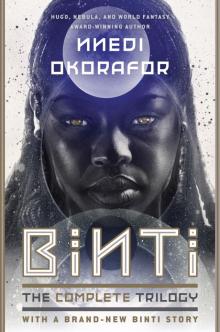 Binti, The Complete Trilogy: Binti ; Home ; The Night Masquerade
Binti, The Complete Trilogy: Binti ; Home ; The Night Masquerade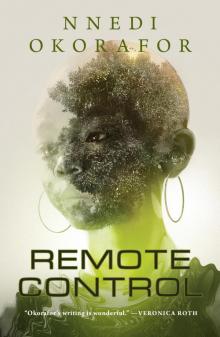 Remote Control
Remote Control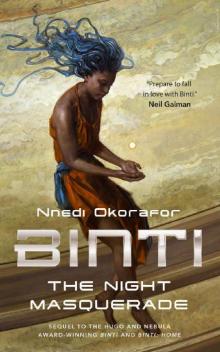 Binti: The Night Masquerade
Binti: The Night Masquerade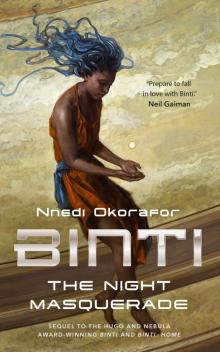 Binti--The Night Masquerade
Binti--The Night Masquerade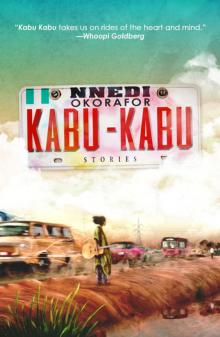 Kabu Kabu
Kabu Kabu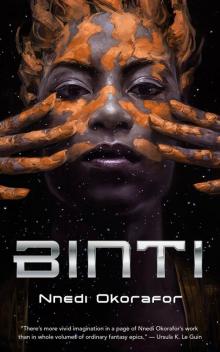 Binti
Binti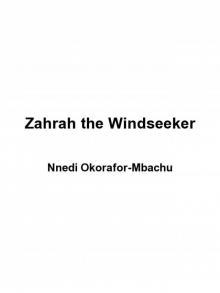 Zahrah the Windseeker
Zahrah the Windseeker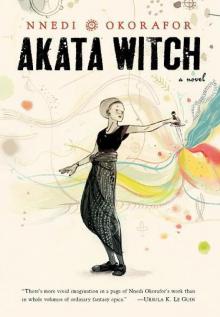 Akata Witch: A Novel
Akata Witch: A Novel Ikenga
Ikenga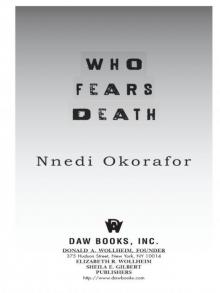 Who Fears Death
Who Fears Death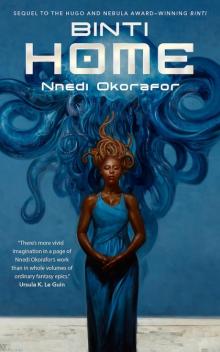 Binti--Home
Binti--Home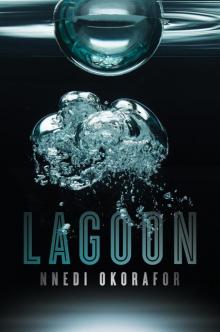 Lagoon
Lagoon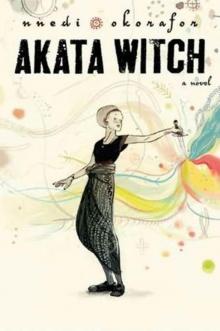 Akata Witch
Akata Witch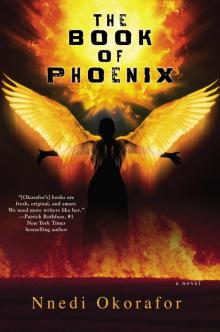 The Book of Phoenix
The Book of Phoenix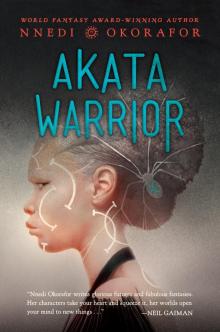 Akata Warrior
Akata Warrior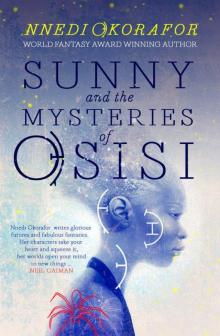 Sunny and the Mysteries of Osisi
Sunny and the Mysteries of Osisi